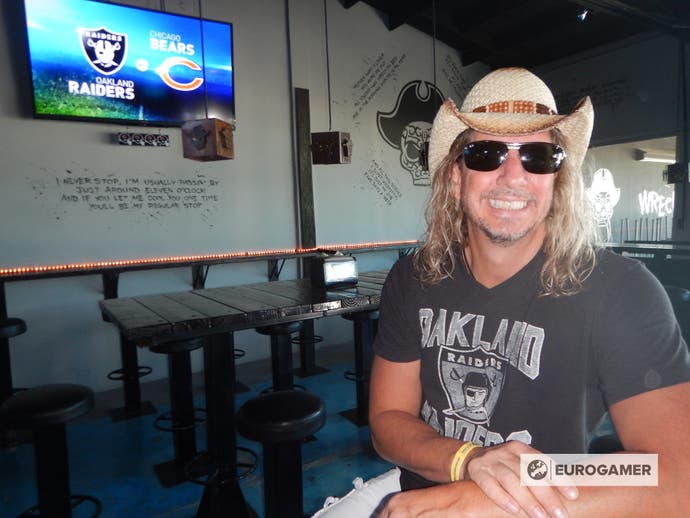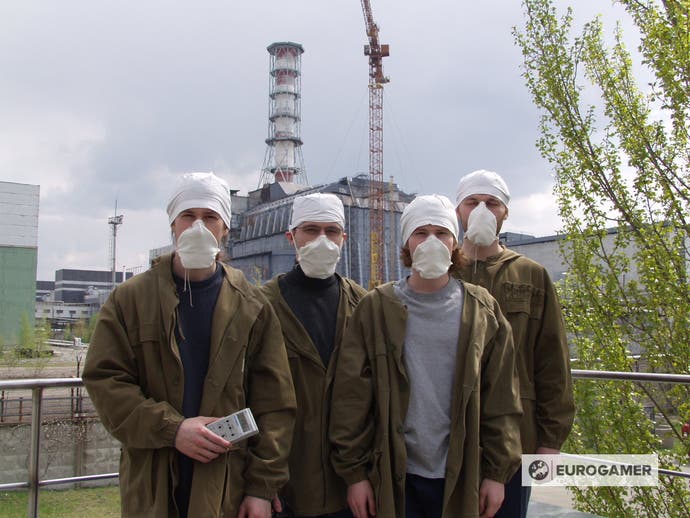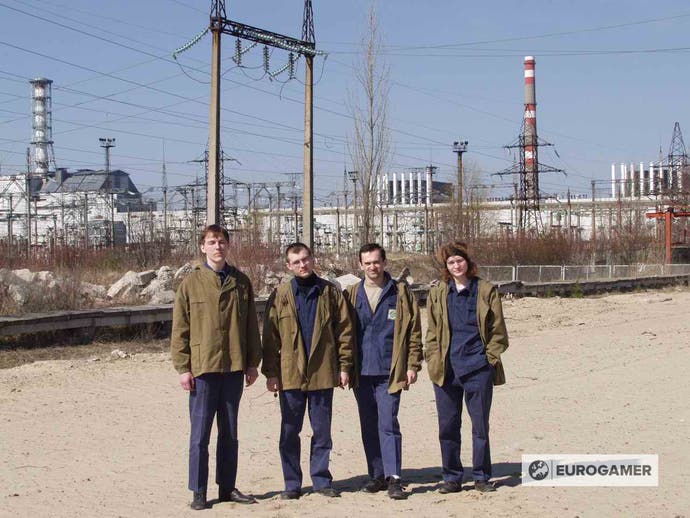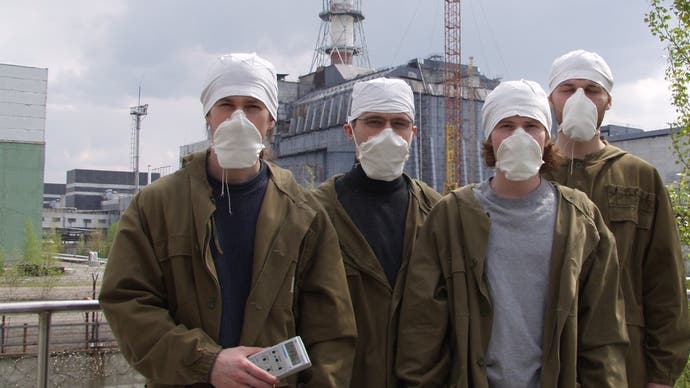The Californian sent to save Stalker: Shadow of Chernobyl from development hell
"Who the f*** is this guy?"
In a restaurant somewhere in sunny Los Angeles County, 13 years ago, two old friends were having lunch. Wine and conversation were flowing. They remembered how they'd met at LucasArts in the 90s. They weren't there to talk business but they did because video games were their bread and butter. One of the men, Jack Sorensen, was reeling-off job opportunities he knew of - he being executive vice president of worldwide studios at games publisher THQ. "THQ Australia?" he enquired. But the other man, Dean Sharpe, didn't seem interested. He had closed his own studio Big Ape Productions a couple of years earlier, dropped off the radar and taken a break, and now he was ready for something new. But Sharpe wanted a challenge.
Sorensen dangled the bait. "It was somewhere during the second bottle of wine he mentioned he had this crazy thing in Ukraine," Dean Sharpe tells me over Skype now (he never did get fully back on the radar and he's a hard man to find). "Wow Ukraine," he thought to himself, "that sounds interesting."
Sorensen outlined his problem: THQ had a team making a fascinating game in Ukraine called Stalker: Shadow of Chernobyl. The game was dark and massive, set around the twisted disaster zone of the Chernobyl nuclear power plant. It was part shooter, part role-playing game, part eerie open-world sandbox adventure. But Stalker was overdue, long overdue, and Sorensen needed someone on the ground out there to finish it - someone in Ukraine to be THQ personified, day in day out, doing whatever it took to get the game done.
"It was, without a doubt, two of the worst weeks of my life."
"I thought we were just joking around. I really didn't think he was serious. Keep in mind I've known Jack for a very long time," Sharpe says. "90 per cent of what Jack and I say to one another is sarcasm - so I just went along with it. By the end of our third bottle of wine we had agreed I was going to go check it out." It wasn't until THQ asked for his passport details the next morning the penny dropped. "Holy shit - what?!" spluttered Sharpe. "You've got to be kidding me!" He was on a plane the next week.
There's something you should know about Dean Sharpe before he lands in Ukraine: he stands out. Maybe not standing on the beach in California, where tanned, long-blonde-haired vest-wearing surfers are a dime a dozen, but in dour Eastern Europe he stands out. Sharpe was about to get the culture shock of his life. "Before I knew it I was in Kiev, middle of winter and it was miserable. Had I the balls to do it," he says, "I would have turned around the second I walked out the airport - walked back in and got on a plane and never gone back, ever. Ever.
"It was just horrible," he goes on. "I was just in California - I didn't even have a real jacket!" Nor did Sharpe have a driver to meet him at the airport, and the hotel he thought he had a reservation at had no recollection of one. Sharpe didn't speak a word of Russian and they didn't speak a word of English. "I was terrified," he says.

The architecture did nothing to settle his nerves. Not the beautiful buildings in downtown Kiev around Khreshchatyk Street, which are the sort of thing you see on a postcard, but the slab of Soviet concrete in the middle of nowhere where the game was being made. Sharpe was used to game companies looking like LucasArts, like movie sets, overflowing with colour and character, with people firing foam Nerf pellets around. Not here. Here the walls were white and bare. "No posters, no swag from shows or anything like that. It was just desk, monitor, desk, monitor, desk, monitor. It felt like a hospital to me," he says. "I remember going to the bathroom and looking out the window and thinking it literally looked like a scene from Stalker."
The developers' reaction to Sharpe was as frozen as the wilderness surrounding them. "You've seen me for a second, what I look like. I'm this long-haired blonde guy that comes in wearing a tanktop and flip flops, very Californian, 'Oh hi!', big smiles. They're like: 'Who the fuck is this guy?' They weren't exactly excited to see me." It made assessing the state their game was in like getting blood from a stone. Sharpe was trying to communicate via a translator with a team which had no interest in talking to him. "It was, without a doubt," he says, "two of the worst weeks of my life."
Sharpe couldn't get back on the plane to California quick enough. After all, he was only scoping the situation out, he could still tell Sorensen "no", and he did. "There's no way," Sharpe told Sorensen. "I'm not going back there. It's not going to happen."
But Sorensen knew his friend well; he knew Sharpe wouldn't let the idea go. It appealed to his ego as the only person crazy enough and free enough to take the challenge on. "It's one project," Sharpe told himself. "Go get it done."
Stalker's problems began the moment GSC started talking about the game, in 2000/2001. No one listened to a young independent studio from Ukraine so GSC exaggerated a bit. It's what got the studio's first game Cossacks noticed, so with Stalker GSC tried the same again. This was going to be, PR manager Olev Yavorsky remembers telling fans, "the ultimate game of all time".

"We had it all there," he tells me now. "An ultimate shooter with all these anomalies [very dangerous pockets of energy], with A-Life [emergent artificial intelligence] going on around you, with [non-player characters] competing against the player in the playthrough - the concept was an NPC could even complete the game ahead of the player." It didn't matter GSC had no idea how to build it because nothing had actually been built. "From day one we started promoting the concept," says Yavorsky. "We were trying to over-hype it."
The noise attracted THQ and a publishing deal, but GSC then had to build the game. "We started putting together all these elements of the game and realised it wouldn't work," Yavorsky says. Stalker development became a painstaking process of trial and error, of naive, constant redesign. "That's why it was taking us years to build and why it was constantly postponed." And the over-hyping returned to bite GSC in the ass. "Initially many people were totally in love with the concept of the game and waited for it so eagerly and passionately, but when it was delayed once then delayed again, they turned into avid haters of what we'd been doing," he says. "They called us liars."
It all came to a head in 2003 - the game's original release date can you believe? - when a nowhere-near-finished build of Stalker was leaked online. "I remember coming to the office in the morning and there came this news..." Yavorsky recalls. "It started on a forum somewhere but then it spread like wildfire. The links to the build started spreading. We were trying to cut it down by deleting the link but it's the internet, it's impossible to stop."
There was no great mastermind behind the leak - this was no Boy Who Stole Half-Life 2, coincidentally mere months before. Simply, carelessly, someone had uploaded an unprotected build of Stalker to an FTP, where a snarling pack of fans had sniffed it out. Powerless, all the team could do was watch. "We had never experienced a situation like this. It was really stressful," Yavorsky says. "It was really unpleasant."
Fortunately, the build went down well - so much so some people still believe the leak was a PR stunt. "It wasn't," Yavorsky assures me. But for publisher THQ it rang yet more alarm bells. Another reason Sorensen needed someone in Ukraine he could trust to finish the game.
"When I eventually went back," Dean Sharpe says, "they put me in this giant office by myself. It was huge; it had to be a hundred square metres. It was an office which could easily have held 25 people and it was just me on this one desk by myself, in this white office with a monitor and a keyboard and that was it." Even a visiting accountant told him it was sparse. "I'm thinking, 'Wow, if an accountant tells you it's a boring office you know it's gotta be pretty bad.'"
Attitudes towards Sharpe hadn't warmed nor did he expect them to. He was there to manhandle a team's dream project into a shippable state. He'd once thrown someone - physically picked him up and thrown him - from his Big Ape office for trying to do the same. He knew the role he had to play. "I didn't expect to be liked, I wasn't there to be liked. I was there to be the bad guy," he says, "so it's not surprising I was."
GSC didn't want to know. "They all hated me," he says. When he tried to deliver his mission statement they just talked over him. "I could tell from people skills what was being translated wasn't what was being said." Enough was enough, he needed to get his message through. "I remember slamming my fist down on the table and telling Oleg [Yavorsky] to translate exactly what I said. I said, 'You guys can go fuck yourselves and fix your own fucking game,' and I left."
"What the fuck is some American guy doing coming in and destroying our game?"
When Sharpe walked back in he took GSC CEO Sergiy Grigorovich aside and calmly told him, "You're not going to get paid any more unless you finish it." Sharpe had talked to THQ and been put in charge of the milestone schedule, which GSC had to meet in order to get paid. "They didn't really have much of a choice."
Out came the proverbial hacksaw. "That has to go, that has to go, cut that, cut that," Sharpe was saying. "No that's not going to happen - sounds great but save it for the sequel." The time for grand plans and half-measures was over.
Stalker lost a zone, lost monsters - lost zombies, according to Yavorsky - lost vehicles, and the artificial intelligence was redesigned. But the biggest thing Dean Sharpe faced backlash over was cutting sleep. "The plan was still to have resting in Stalker," he says. "For me, from my standpoint, it wasn't that tough of a call. I was looking at the test reports and the amount of bugs associated with this feature. I didn't see the value based on the number of bugs it was creating. We could get rid of half-a-bug-report by cutting one feature. It was a no-brainer." But the community felt otherwise.
"The community view was, 'What the fuck is some American guy doing coming in and destroying our game?' I was even getting death threats on a daily basis from the community," Sharpe says. "We had one THQ actually turned over to the authorities because it was pretty violent what it said was going to be done to me." For a long time there was caricature of him going around the internet with the slogan "The Castration of Stalker". I see why Sharpe prefers life off the radar.

But whatever anyone thought of Dean Sharpe, he was getting the job done. "I don't know if they ever really cooperated. It's not like I ever hung out with those guys or went drinking or socialising with them - I never felt, at least during the GSC days, there was any love lost on their side, never got the impression I was accepted at any one point. But in all fairness, why would I?" he says. "They did what they had to do. They begrudgingly accepted what I said." And in March 2007, Stalker: Shadow of Chernobyl was released.
"I just want to sleep now," Oleg Yavorsky remembers feeling. "We were exhausted." The team waited anxiously for reviews to come in. "We thought it would either be a complete flop or a complete success," he says, "and if you take a look at reviews that's how people were reacting. They were passionate about the game but either complete fans or haters. There was no opinion somewhere in the middle, only extremes."
Jim Rossignol reviewed Stalker for Eurogamer. "It isn't finely polished and it's not Hollywood," he wrote, "this is more like an antidote to the Americanised way of doing things. It's a warped behemoth from Ukraine, and one of the scariest games on the PC." It was clear Stalker wasn't going to be for everybody, but by definition cult classics never are.
Expansions Clear Sky and Call of Pripyat followed in the years after but the big sequel never did. GSC, under dubious management, was closed. Staff filtered out, most of them to either start-up Vostok Games, which is now making Stalker-inspired battle royale game Fear the Wolves, or to 4A Games, creator of the tonally-similar Metro series. GSC did not close completely, and even recently announced Stalker 2 development, but with the all the talent now elsewhere the company is a ghost of what it once was. I'll be surprised if the game ever comes out.
Dean Sharpe had taken on the challenge and won. He was free to return to warm California to tan and smile, and enjoy long, wine-soaked lunches with his old friend Jack Sorensen who, let's face it, would owe him. He just had one last show to take Stalker to - a show some former GSC developers happened to be showing their new game Metro 2033 at.
"Just out of curiosity I went over there and I saw Metro," Sharpe says. "I was immediately in awe." He rushed back to the THQ booth to tell business development boss Kelly Flock - another old friend (he had hired Sharpe at LucasArts after playing softball with him and drinking beer) - what he saw.
"We should do this," Flock said.
"You guys should absolutely do this," Sharpe agreed.
"We're only doing it if you stay," Flock replied.
Silence.
"Ah fuck."
A decade later, Sharpe is CEO of 4A Games. The plane back to California will have to wait.

